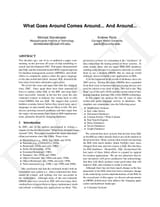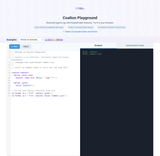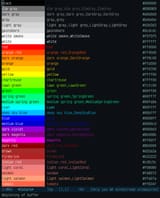Anonymous
8/8/2025, 6:57:13 PM
No.106191893
[Report]
>>106191923
>>106194854
>>106207981
>>106208232
>>106266463
>>106274960
(λ) - Le Lisp General
>Lisp is a family of programming languages with a long history and a distinctive parenthesized prefix notation. There are many dialects of Lisp, including Common Lisp, Scheme, Clojure and Elisp.
>Emacs is an extensible, customizable, self-documenting free/libre text editor and computing environment, with a Lisp interpreter at its core.
>Emacs Resources
https://gnu.org/s/emacs
https://github.com/emacs-tw/awesome-emacs
https://github.com/systemcrafters/crafted-emacs
>Learning Emacs
C-h t (Interactive Tutorial)
https://emacs.amodernist.com
https://systemcrafters.net/emacs-from-scratch
http://xahlee.info/emacs
https://emacs.tv
>Emacs Distros
https://spacemacs.org
https://doomemacs.org
>Elisp
Docs: C-h f [function] C-h v [variable] C-h k [keybinding] C-h m [mode] M-x ielm [REPL]
https://gnu.org/s/emacs/manual/eintr.html
https://gnu.org/s/emacs/manual/elisp.html
https://github.com/emacs-tw/awesome-elisp
>Common Lisp
https://lispcookbook.github.io/cl-cookbook
https://cs.cmu.edu/~dst/LispBook
https://gigamonkeys.com/book
https://lem-project.github.io
https://stumpwm.github.io
https://nyxt-browser.com
https://awesome-cl.com
>Scheme
https://scheme.org
https://try.scheme.org
https://get.scheme.org
https://books.scheme.org
https://standards.scheme.org
https://go.scheme.org/awesome
https://research.scheme.org/lambda-papers
>Clojure
https://clojure.org
https://tryclojure.org
https://clojure-doc.org
https://calva.io
https://clojure.land
https://www.clojure-toolbox.com
https://mooc.fi/courses/2014/clojure
https://clojure.org/community/resources
>Other
https://github.com/dundalek/awesome-lisp-languages
>Guix
https://guix.gnu.org
https://nonguix.org
https://systemcrafters.net/craft-your-system-with-guix
https://futurile.net/resources/guix
https://github.com/franzos/awesome-guix
>SICP/HtDP
https://web.mit.edu/6.001/6.037/sicp.pdf
https://htdp.org
>More Lisp Resources
https://rentry.org/lispresources
(setf *prev-bread* >>106094218)
>Emacs is an extensible, customizable, self-documenting free/libre text editor and computing environment, with a Lisp interpreter at its core.
>Emacs Resources
https://gnu.org/s/emacs
https://github.com/emacs-tw/awesome-emacs
https://github.com/systemcrafters/crafted-emacs
>Learning Emacs
C-h t (Interactive Tutorial)
https://emacs.amodernist.com
https://systemcrafters.net/emacs-from-scratch
http://xahlee.info/emacs
https://emacs.tv
>Emacs Distros
https://spacemacs.org
https://doomemacs.org
>Elisp
Docs: C-h f [function] C-h v [variable] C-h k [keybinding] C-h m [mode] M-x ielm [REPL]
https://gnu.org/s/emacs/manual/eintr.html
https://gnu.org/s/emacs/manual/elisp.html
https://github.com/emacs-tw/awesome-elisp
>Common Lisp
https://lispcookbook.github.io/cl-cookbook
https://cs.cmu.edu/~dst/LispBook
https://gigamonkeys.com/book
https://lem-project.github.io
https://stumpwm.github.io
https://nyxt-browser.com
https://awesome-cl.com
>Scheme
https://scheme.org
https://try.scheme.org
https://get.scheme.org
https://books.scheme.org
https://standards.scheme.org
https://go.scheme.org/awesome
https://research.scheme.org/lambda-papers
>Clojure
https://clojure.org
https://tryclojure.org
https://clojure-doc.org
https://calva.io
https://clojure.land
https://www.clojure-toolbox.com
https://mooc.fi/courses/2014/clojure
https://clojure.org/community/resources
>Other
https://github.com/dundalek/awesome-lisp-languages
>Guix
https://guix.gnu.org
https://nonguix.org
https://systemcrafters.net/craft-your-system-with-guix
https://futurile.net/resources/guix
https://github.com/franzos/awesome-guix
>SICP/HtDP
https://web.mit.edu/6.001/6.037/sicp.pdf
https://htdp.org
>More Lisp Resources
https://rentry.org/lispresources
(setf *prev-bread* >>106094218)

























































